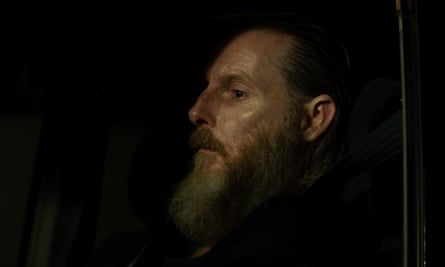A creeping sense of dread permeates the second feature film of writer/director Thomas M Wright, who burst out the gates with Acute Misfortune in 2018, which was not just a great biopic (of the artist Adam Cullen), but one of the best Australian films of the decade. The Stranger has a texture reminiscent of films by fellow Australian filmmaker Justin Kurzel, particularly Snowtown and Nitram, with scaled-back colour schemes, compositions that are stylised – but never flashy – and graded in a slightly off-colour way, as if the characters have stained the surface of the film, contaminating it from the inside.
Our narrative pathway into this sophisticated, meditative picture is via Henry (Sean Harris), an ex-con and drifter who meets a stranger, Paul (Steve Mouzakis), on a bus; cinematographer Sam Chiplin creates a surreal theatricality by blackening out the space around them. Paul tells Henry he knows where he can find some work – not of the legal kind – and soon Henry has entered the web of Mark (Joel Edgerton), an undercover police officer posing as a mid-level gangster. The film spends a lot of time with Mark and Henry, and you’re not sure what either man is capable of.
The Stranger is a “cracking the case” narrative, pulling us into the mission to identify the kidnapper and murderer of a boy who went missing several years ago. A full picture of the operation gradually emerges; for a long time it’s not exactly clear who the suspect is, or even the nature of the case. Wright was inspired by the real-life investigation to find the man who murdered 13-year-old Daniel Morcombe, whose family have spoken out against this film. However, Morcombe is not named, and neither the boy nor the crime are depicted. If viewers went in cold, it’s unlikely they would connect the film to real-life events.
Among its unconventional elements is the use of Edgerton’s character as a means to examine trauma, which is more often depicted as being experienced by victims, and sometimes their communities, but rarely cops. The Stranger is different: Mark’s anguish over his work feels terribly real, and this creates a captivating psychological energy that washes over everything. It’s hard to pull off a good dream sequence but Wright – who has a great knack for making characters feel stranded inside themselves – helms more than one, blurring the inner world with the outer, and pulling us deeper into Mark’s mind.

The performances are crucial. Edgerton is at his best with a brooding, gloomy performance, exploring the dark ramifications of undercover work in a way that feels fresh and intensely captivating. He’s one of those famous actors who seems to have no problem disappearing into unglamorous characters; his role choices, in fact, seem partly engineered to avoid glamour entirely. Harris, meanwhile, is almost too good, almost too convincing as Henry, who you wouldn’t want to encounter in a dark laneway.
Wright’s stylistic flourishes use cinematic expression without removing us from the reality of the picture. White lines in the middle of a road provide visual rhythm in one scene; in another, after Henry and Mark meet, the camera remains in the car transporting them, but cuts from day to night, condensing time. Behind the back shots, removing the face as a reference point, are carefully used. The Stranger avoids both neat explanations and contrived ambiguity, when narrative pieces are shuffling around to confuse audiences.
Speaking purely in terms of police genre stories, there is a scene, about 30 minutes before the end (no spoilers) that I haven’t seen the likes of before: certainly not on this level, with everything coming together at once, and with so much weight behind it all. The plot event in question dramatically registers, but there’s a mood, a tone, an intangible energy that takes it somewhere else, swelling the joints of the film and rattling the bones of the characters and the audience. By that point, it’s abundantly clear that The Stranger has crept, assiduously, into brilliance; to call it an unconventionally impressive crime drama is to put it very lightly.
The Stranger is currently screening as part of the 2022 Melbourne international film festival. It will have a theatrical release in Australia in October 2022, before getting a global release on Netflix that month.

Comments (…)
Sign in or create your Guardian account to join the discussion